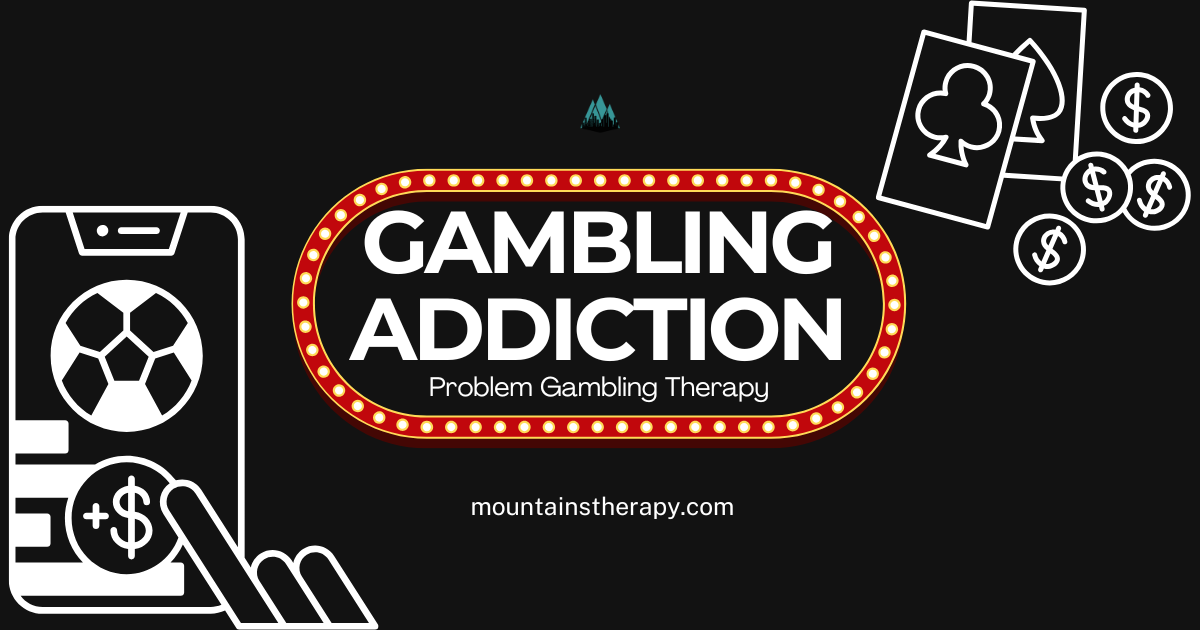Gambling Addiction Awareness Month: Understanding & Overcoming Problem Gambling
Learn more about Addiction Therapy.
In This Blog, You’ll Learn:
✅ What gambling addiction is and how it develops
✅ Signs of problem gambling
✅ How gambling addiction affects mental health and relationships
✅ Effective treatment options for gambling addiction
✅ How to get professional help at Mountains Therapy NJ
What Is Gambling Addiction?
Gambling addiction, also known as problem gambling, is a compulsive urge to gamble despite negative consequences. It can lead to severe emotional, financial, and social problems. Some people may not even realize they have a problem until gambling starts interfering with their daily lives. Many wonder, what is gambling addiction definition? It is classified as a behavioral addiction that involves a lack of control over gambling behaviors, leading to distress and dysfunction.
How Gambling Addiction Starts
Understanding how gambling addiction starts is crucial. Many individuals begin gambling recreationally, but over time, repeated exposure to high-risk bets and the rush of winning can rewire the brain’s reward system. How gambling addiction works is similar to substance addiction, as it triggers dopamine releases, reinforcing the habit.
Signs of Problem Gambling
Recognizing the warning signs of gambling addiction can help prevent it from escalating. Some key indicators include:
- Feeling restless or irritable when not gambling
- Lying to friends and family about gambling habits
- Gambling with increasing amounts of money to chase losses
- Struggling to stop or control gambling behavior
- Neglecting responsibilities at work, school, or home due to gambling
- Borrowing money or going into debt to gamble
What Does Gambling Addiction Look Like & Feel Like?
Many individuals question, what does gambling addiction look like? It often presents as secretive behavior, financial instability, and emotional distress. What does gambling addiction feel like? It can cause extreme anxiety, guilt, and an inability to focus on anything but gambling. If you or a loved one exhibit these signs, seeking professional support from an addiction therapist near me can be a crucial step toward recovery.
How Gambling Addiction Affects Mental Health
Gambling addiction impacts more than just finances—it takes a toll on mental health as well. The psychological effects of problem gambling can include:
- Can gambling addiction cause anxiety? Yes, compulsive gambling leads to chronic stress and anxiety due to financial pressures and secrecy.
- Can gambling addiction lead to depression? Yes, individuals struggling with gambling addiction often experience depressive symptoms from feelings of failure and regret.
- Why gambling addiction is bad? It not only affects mental health but also damages relationships, work performance, and financial stability.
- Why is gambling addiction psychology important? Understanding the underlying psychology behind gambling addiction helps in developing better treatment strategies.
If you’re struggling with these issues, seeking addiction therapy near me can help you find effective ways to regain control and rebuild your life.
How Gambling Addiction Affects Relationships
Gambling addiction can strain relationships with family, friends, and colleagues. How gambling addiction affects relationships includes:
- Loss of Trust: Lying about gambling habits can damage trust with loved ones.
- Financial Struggles: Gambling can lead to significant debt, affecting both personal and family finances.
- Emotional Distance: Those struggling with gambling addiction may withdraw emotionally or become secretive about their activities.
- Increased Conflict: Stress and financial strain can lead to arguments and misunderstandings within relationships.
Therapy, such as addiction counseling near me, can provide valuable support in restoring trust and rebuilding relationships.
How Is Gambling Addiction Treated?
At Mountains Therapy NJ, we offer evidence-based treatments to help individuals overcome gambling addiction and regain control of their lives.
1. Cognitive Behavioral Therapy for Gambling Addiction
- Cognitive Behavioral Therapy (CBT) helps individuals recognize negative thought patterns and behaviors associated with gambling. CBT focuses on:
- Identifying gambling triggers and high-risk situations
- Developing healthier coping strategies
- Changing compulsive gambling behaviors
- Strengthening impulse control and decision-making skills
- Learn more about CBT for gambling addiction.
2. Mindfulness Therapy for Gambling Addiction
- Mindfulness therapy helps individuals develop self-awareness and emotional regulation, reducing the urge to gamble. This approach includes:
- Practicing deep breathing and meditation techniques
- Managing gambling-related stress and anxiety
- Cultivating awareness of thoughts and urges without acting on them
- Building resilience against gambling triggers
- Learn more about mindfulness for gambling addiction.
When Does Gambling Become an Addiction?
Many ask, when is gambling an addiction? or when does gambling become an addiction? Gambling turns into an addiction when it interferes with daily life, finances, mental health, and relationships.
- When was gambling addiction added to the DSM? Gambling Disorder was officially classified as an addiction in the DSM-5 in 2013.
- Where does gambling addiction come from? Genetics, environmental factors, and psychological conditions all contribute to gambling addiction.
- Can gambling addiction be genetic? Yes, research suggests a genetic predisposition to addictive behaviors, including gambling.
- Why is gambling the worst addiction? Unlike substance abuse, gambling addiction often remains hidden until severe financial and emotional consequences occur.
Where to Get Help for Gambling Addiction
If you or a loved one are struggling, you may be wondering, where to go for gambling addiction or who to call for gambling addiction. You can seek help from:
- Who treats gambling addiction? Licensed therapists specializing in addiction treatment.
- Who can help with gambling addiction? Support groups, addiction counselors, and mental health professionals.
- Where to get help gambling addiction? Mountains Therapy NJ offers personalized treatment plans.
To learn more about our services or to schedule an appointment, please visit our contact page. We offer a free initial phone consultation to discuss your needs and how we can support your recovery journey.
You Are Not Alone
Gambling addiction can feel overwhelming, but recovery is possible. If you or a loved one needs immediate support, reach out for professional help today. There is hope, and healing is within reach.











